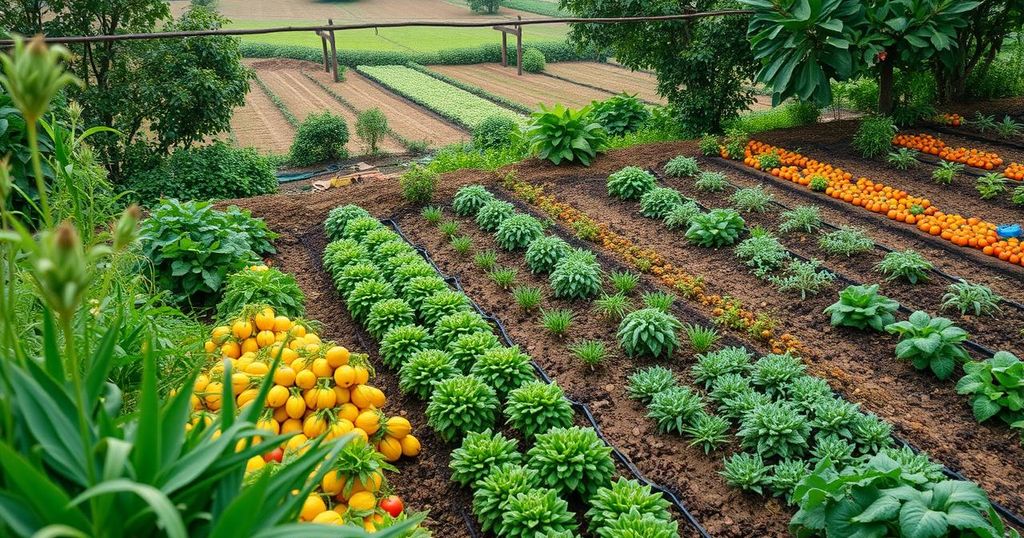The 2024 World Agri-food Innovation Conference emphasized the urgent need for an innovation-driven green transition in the agri-food sector to combat climate change impacts. Experts noted significant declines in food production due to rising temperatures, while highlighting China’s ambition to enhance food output and its contributions to global food security. Sustainable practices and technological innovations were deemed essential for overcoming current challenges in agriculture.
The call for a green transition within the agri-food sector has gained momentum, particularly following the discussions at the 2024 World Agri-food Innovation Conference (WAFI 2024) in Beijing. A global panel of agricultural experts has emphasized the urgent need to innovate towards a more sustainable food system as a means to mitigate the adverse effects of climate change, notably the increasing carbon emissions stemming from food production processes. Experts note that while warmer climates have yielded some short-term benefits for specific food-producing regions, the overall agricultural landscape is increasingly threatened by unpredictable weather patterns that disrupt production across Asia, Africa, and South America. Sun Qixin, the president of China Agricultural University, articulated that prevailing models indicate a 6 to 8 percent decline in food yield for each degree Celsius increase in global temperature, barring the introduction of significant technological advancements. Despite the potential for warmer temperatures to positively affect certain agricultural zones previously afflicted by cold and drought, the disruptive forces of climate change continue to challenge global food security. Professor Fu Wenge from China Agricultural University highlighted the importance of integrating modest, cost-effective management innovations to facilitate green transitions without compromising output levels. An example of this is the university’s Science and Technology Backyard project that engages students in rural development alongside local farmers, promoting sustainable practices and high-yield crops. Ismahane Elouafi, the executive managing director of CGIAR, reinforced the notion that green transitions necessitate innovations across various sectors, combining technological, policy, and institutional reforms. She remarked on the pressing nature of climate change impacts, advocating for comprehensive innovative strategies to transform agricultural systems. Additionally, the efficacy of food production must now be evaluated through the prism of environmental stewardship. Patrick Caron, vice-chair of the CGIAR system board, acknowledged historical successes in food production, underscoring the need to pursue increases with a heightened awareness of climate change and ecological preservation. While the global food security situation appears precarious, some view China’s ambitious target of bolstering its food production capacity to 700 million metric tons by 2030 as a beacon of hope. This perspective is supported by Elouafi, who cited China’s successful combination of productivity enhancements and poverty alleviation as exemplary. As World Food Day approaches, Foreign Ministry spokeswoman Mao Ning reiterated China’s commitment to global food security, emphasizing the nation’s support for international collaborations under the South-South Cooperation Programme orchestrated by the Food and Agriculture Organization (FAO). China’s proactive engagement in food security initiatives underscores its dedication to eradicating global hunger.
The article discusses the critical need for a green transition in the agri-food sector, driven by innovative strategies that address climate change and its impact on food production. The 2024 World Agri-food Innovation Conference (WAFI 2024) served as a platform for leading experts to discuss the implications of climate change on agriculture, presenting both the challenges and opportunities that arise from warmer temperatures and changing weather patterns. It underscores the significance of technological advancements and sustainable practices in achieving food security while minimizing the sector’s carbon footprint. The context is further enriched by China’s ambitious food production objectives and its role in global agricultural innovation.
In conclusion, the call for a green transition in the agri-food sector is both timely and critical. Emphasizing innovation and sustainability, experts urge the agricultural community to adapt to the challenges posed by climate change. The insights shared during the WAFI 2024 highlight the necessity of integrating technology and sustainable practices to enhance food production while reducing environmental impact. China’s proactive initiatives stand as an example for other nations, reiterating the importance of collaborative efforts to ensure global food security and combat hunger effectively.
Original Source: en.people.cn







